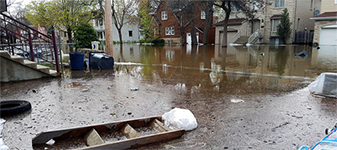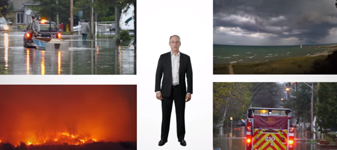What are the costs of not acting on climate change?
Inaction on climate change carries significant costs for Canadians
- Even at a modest level of warming of 1.5°C or 2°C, the Intergovernmental Panel on Climate Change (IPCC) estimates the global cost of the associated damages at $54 and $69 trillion, respectively—that includes impacts to our health, our homes, and our economy.
- Even moderate forecasts suggest the costs of climate change will vastly outweigh any potential benefits such as tourism or agricultural productivity, especially in the long term.
- Canada’s contribution to the global effort to avoid these costs will make an impact.
- Without additional policies to reduce greenhouse gas emissions, the OECD estimates that climate change could reduce the level of global GDP by 1% to 3% by 2060. By the end of the century, it could reduce global GDP by 10%.
Climate change is already costing Canadians
- Hotter temperatures, more extreme weather events, poorer air quality, and increased water scarcity are negatively affecting Canadians’ health and well-being.
- While it is difficult to conclusively link any particular event to climate change, we can observe a number of recent events that are consistent with the expected effects of climate change.
- Globally, the five hottest years on record have occurred since 2010
- Alberta and Quebec experienced record-breaking heat in 2018; dozens died in Quebec as a result of the heat wave (a recent study found that climate change made Europe’s 2018 heatwave twice as likely)
- British Columbia’s two worst wildfire seasons on record were 2017 and 2018
Climate change will cost Canadians even more in the future
- Climate change—in the form of extreme temperatures, more frequent and severe weather events, and decreases in air quality—will be damaging to Canadians’ health and wellbeing, our economy, and our environment.
- Climate change will affect economic activity; for example, it is expected to reduce output in the forestry sector, costing between $2 and $17 billion per year by the 2050s.
- Climate change is also expected to greatly increase risk of flooding, which could cost Canada between $1 and $8 billion per year by the 2050s.
- Sea-level rise will increase the likelihood of extreme storm surges and flooding on Canada’s coasts.
- If emissions continue unabated, large portions of Western Canada will get significantly drier, while the coasts will get significantly wetter.
Other Resources
More Fast Facts on Carbon Pricing



